Bardoxolone Methyl in Chronic Kidney Disease
VerifiedAdded on 2020/02/03
|11
|4054
|72
Literature Review
AI Summary
This assignment focuses on the drug bardoxolone methyl and its use in treating chronic kidney disease (CKD), particularly in patients with type 2 diabetes. It examines various clinical trials, such as the BEACON trial, and analyzes their findings regarding the efficacy and safety of bardoxolone methyl in slowing the progression of CKD. The assignment also delves into the broader context of CKD, its association with cardiovascular risk, and the implications for patient management.
Contribute Materials
Your contribution can guide someone’s learning journey. Share your
documents today.
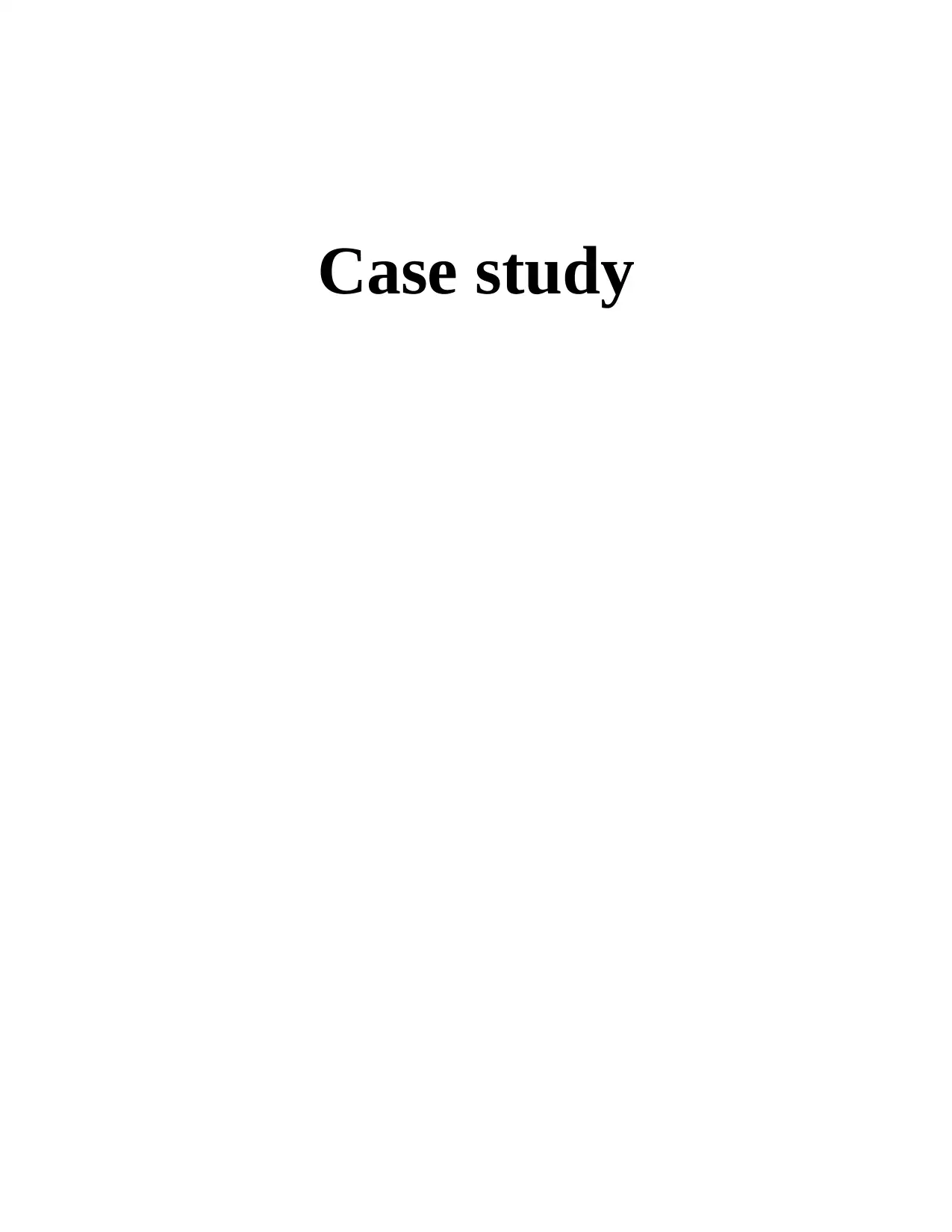
Case study
Secure Best Marks with AI Grader
Need help grading? Try our AI Grader for instant feedback on your assignments.
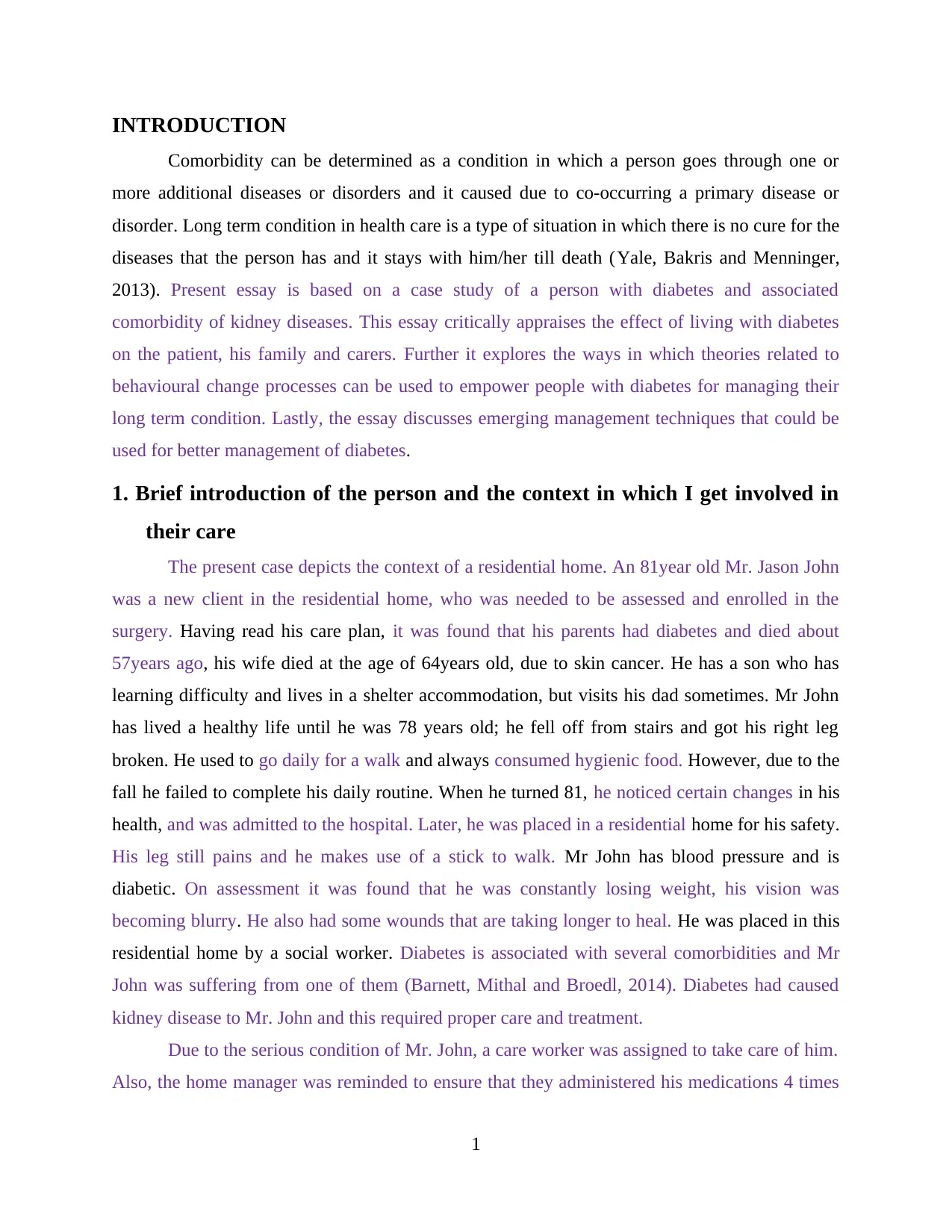
INTRODUCTION
Comorbidity can be determined as a condition in which a person goes through one or
more additional diseases or disorders and it caused due to co-occurring a primary disease or
disorder. Long term condition in health care is a type of situation in which there is no cure for the
diseases that the person has and it stays with him/her till death (Yale, Bakris and Menninger,
2013). Present essay is based on a case study of a person with diabetes and associated
comorbidity of kidney diseases. This essay critically appraises the effect of living with diabetes
on the patient, his family and carers. Further it explores the ways in which theories related to
behavioural change processes can be used to empower people with diabetes for managing their
long term condition. Lastly, the essay discusses emerging management techniques that could be
used for better management of diabetes.
1. Brief introduction of the person and the context in which I get involved in
their care
The present case depicts the context of a residential home. An 81year old Mr. Jason John
was a new client in the residential home, who was needed to be assessed and enrolled in the
surgery. Having read his care plan, it was found that his parents had diabetes and died about
57years ago, his wife died at the age of 64years old, due to skin cancer. He has a son who has
learning difficulty and lives in a shelter accommodation, but visits his dad sometimes. Mr John
has lived a healthy life until he was 78 years old; he fell off from stairs and got his right leg
broken. He used to go daily for a walk and always consumed hygienic food. However, due to the
fall he failed to complete his daily routine. When he turned 81, he noticed certain changes in his
health, and was admitted to the hospital. Later, he was placed in a residential home for his safety.
His leg still pains and he makes use of a stick to walk. Mr John has blood pressure and is
diabetic. On assessment it was found that he was constantly losing weight, his vision was
becoming blurry. He also had some wounds that are taking longer to heal. He was placed in this
residential home by a social worker. Diabetes is associated with several comorbidities and Mr
John was suffering from one of them (Barnett, Mithal and Broedl, 2014). Diabetes had caused
kidney disease to Mr. John and this required proper care and treatment.
Due to the serious condition of Mr. John, a care worker was assigned to take care of him.
Also, the home manager was reminded to ensure that they administered his medications 4 times
1
Comorbidity can be determined as a condition in which a person goes through one or
more additional diseases or disorders and it caused due to co-occurring a primary disease or
disorder. Long term condition in health care is a type of situation in which there is no cure for the
diseases that the person has and it stays with him/her till death (Yale, Bakris and Menninger,
2013). Present essay is based on a case study of a person with diabetes and associated
comorbidity of kidney diseases. This essay critically appraises the effect of living with diabetes
on the patient, his family and carers. Further it explores the ways in which theories related to
behavioural change processes can be used to empower people with diabetes for managing their
long term condition. Lastly, the essay discusses emerging management techniques that could be
used for better management of diabetes.
1. Brief introduction of the person and the context in which I get involved in
their care
The present case depicts the context of a residential home. An 81year old Mr. Jason John
was a new client in the residential home, who was needed to be assessed and enrolled in the
surgery. Having read his care plan, it was found that his parents had diabetes and died about
57years ago, his wife died at the age of 64years old, due to skin cancer. He has a son who has
learning difficulty and lives in a shelter accommodation, but visits his dad sometimes. Mr John
has lived a healthy life until he was 78 years old; he fell off from stairs and got his right leg
broken. He used to go daily for a walk and always consumed hygienic food. However, due to the
fall he failed to complete his daily routine. When he turned 81, he noticed certain changes in his
health, and was admitted to the hospital. Later, he was placed in a residential home for his safety.
His leg still pains and he makes use of a stick to walk. Mr John has blood pressure and is
diabetic. On assessment it was found that he was constantly losing weight, his vision was
becoming blurry. He also had some wounds that are taking longer to heal. He was placed in this
residential home by a social worker. Diabetes is associated with several comorbidities and Mr
John was suffering from one of them (Barnett, Mithal and Broedl, 2014). Diabetes had caused
kidney disease to Mr. John and this required proper care and treatment.
Due to the serious condition of Mr. John, a care worker was assigned to take care of him.
Also, the home manager was reminded to ensure that they administered his medications 4 times
1
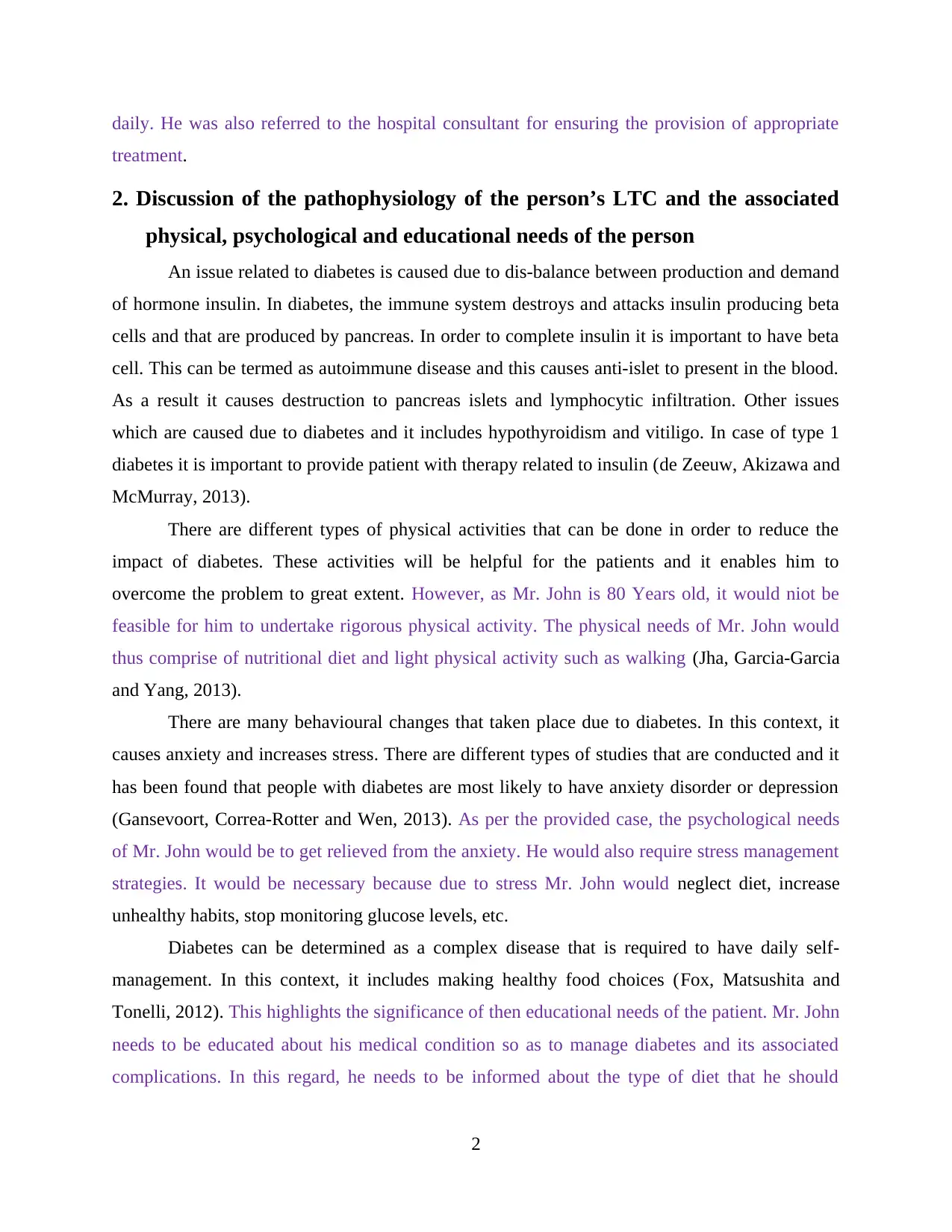
daily. He was also referred to the hospital consultant for ensuring the provision of appropriate
treatment.
2. Discussion of the pathophysiology of the person’s LTC and the associated
physical, psychological and educational needs of the person
An issue related to diabetes is caused due to dis-balance between production and demand
of hormone insulin. In diabetes, the immune system destroys and attacks insulin producing beta
cells and that are produced by pancreas. In order to complete insulin it is important to have beta
cell. This can be termed as autoimmune disease and this causes anti-islet to present in the blood.
As a result it causes destruction to pancreas islets and lymphocytic infiltration. Other issues
which are caused due to diabetes and it includes hypothyroidism and vitiligo. In case of type 1
diabetes it is important to provide patient with therapy related to insulin (de Zeeuw, Akizawa and
McMurray, 2013).
There are different types of physical activities that can be done in order to reduce the
impact of diabetes. These activities will be helpful for the patients and it enables him to
overcome the problem to great extent. However, as Mr. John is 80 Years old, it would niot be
feasible for him to undertake rigorous physical activity. The physical needs of Mr. John would
thus comprise of nutritional diet and light physical activity such as walking (Jha, Garcia-Garcia
and Yang, 2013).
There are many behavioural changes that taken place due to diabetes. In this context, it
causes anxiety and increases stress. There are different types of studies that are conducted and it
has been found that people with diabetes are most likely to have anxiety disorder or depression
(Gansevoort, Correa-Rotter and Wen, 2013). As per the provided case, the psychological needs
of Mr. John would be to get relieved from the anxiety. He would also require stress management
strategies. It would be necessary because due to stress Mr. John would neglect diet, increase
unhealthy habits, stop monitoring glucose levels, etc.
Diabetes can be determined as a complex disease that is required to have daily self-
management. In this context, it includes making healthy food choices (Fox, Matsushita and
Tonelli, 2012). This highlights the significance of then educational needs of the patient. Mr. John
needs to be educated about his medical condition so as to manage diabetes and its associated
complications. In this regard, he needs to be informed about the type of diet that he should
2
treatment.
2. Discussion of the pathophysiology of the person’s LTC and the associated
physical, psychological and educational needs of the person
An issue related to diabetes is caused due to dis-balance between production and demand
of hormone insulin. In diabetes, the immune system destroys and attacks insulin producing beta
cells and that are produced by pancreas. In order to complete insulin it is important to have beta
cell. This can be termed as autoimmune disease and this causes anti-islet to present in the blood.
As a result it causes destruction to pancreas islets and lymphocytic infiltration. Other issues
which are caused due to diabetes and it includes hypothyroidism and vitiligo. In case of type 1
diabetes it is important to provide patient with therapy related to insulin (de Zeeuw, Akizawa and
McMurray, 2013).
There are different types of physical activities that can be done in order to reduce the
impact of diabetes. These activities will be helpful for the patients and it enables him to
overcome the problem to great extent. However, as Mr. John is 80 Years old, it would niot be
feasible for him to undertake rigorous physical activity. The physical needs of Mr. John would
thus comprise of nutritional diet and light physical activity such as walking (Jha, Garcia-Garcia
and Yang, 2013).
There are many behavioural changes that taken place due to diabetes. In this context, it
causes anxiety and increases stress. There are different types of studies that are conducted and it
has been found that people with diabetes are most likely to have anxiety disorder or depression
(Gansevoort, Correa-Rotter and Wen, 2013). As per the provided case, the psychological needs
of Mr. John would be to get relieved from the anxiety. He would also require stress management
strategies. It would be necessary because due to stress Mr. John would neglect diet, increase
unhealthy habits, stop monitoring glucose levels, etc.
Diabetes can be determined as a complex disease that is required to have daily self-
management. In this context, it includes making healthy food choices (Fox, Matsushita and
Tonelli, 2012). This highlights the significance of then educational needs of the patient. Mr. John
needs to be educated about his medical condition so as to manage diabetes and its associated
complications. In this regard, he needs to be informed about the type of diet that he should
2
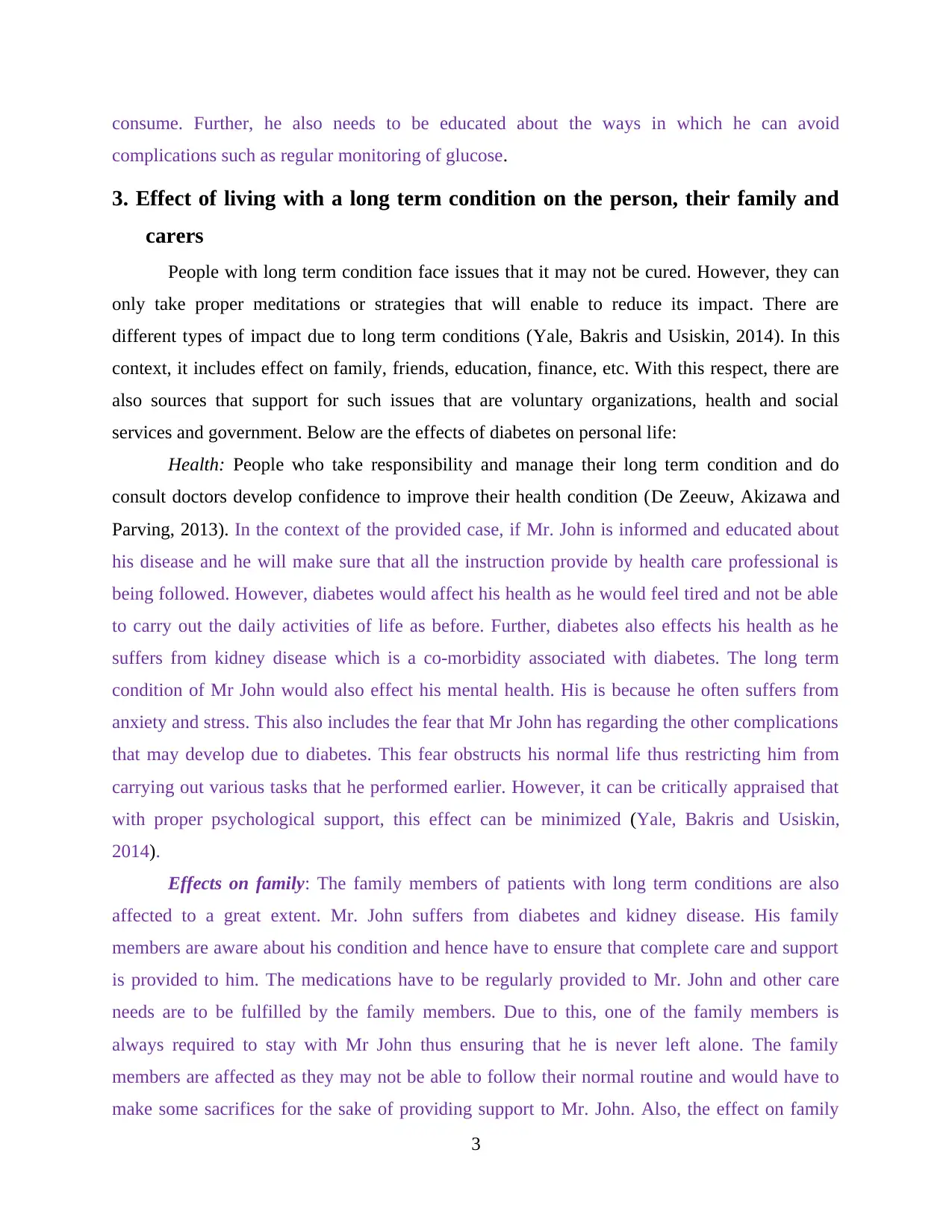
consume. Further, he also needs to be educated about the ways in which he can avoid
complications such as regular monitoring of glucose.
3. Effect of living with a long term condition on the person, their family and
carers
People with long term condition face issues that it may not be cured. However, they can
only take proper meditations or strategies that will enable to reduce its impact. There are
different types of impact due to long term conditions (Yale, Bakris and Usiskin, 2014). In this
context, it includes effect on family, friends, education, finance, etc. With this respect, there are
also sources that support for such issues that are voluntary organizations, health and social
services and government. Below are the effects of diabetes on personal life:
Health: People who take responsibility and manage their long term condition and do
consult doctors develop confidence to improve their health condition (De Zeeuw, Akizawa and
Parving, 2013). In the context of the provided case, if Mr. John is informed and educated about
his disease and he will make sure that all the instruction provide by health care professional is
being followed. However, diabetes would affect his health as he would feel tired and not be able
to carry out the daily activities of life as before. Further, diabetes also effects his health as he
suffers from kidney disease which is a co-morbidity associated with diabetes. The long term
condition of Mr John would also effect his mental health. His is because he often suffers from
anxiety and stress. This also includes the fear that Mr John has regarding the other complications
that may develop due to diabetes. This fear obstructs his normal life thus restricting him from
carrying out various tasks that he performed earlier. However, it can be critically appraised that
with proper psychological support, this effect can be minimized (Yale, Bakris and Usiskin,
2014).
Effects on family: The family members of patients with long term conditions are also
affected to a great extent. Mr. John suffers from diabetes and kidney disease. His family
members are aware about his condition and hence have to ensure that complete care and support
is provided to him. The medications have to be regularly provided to Mr. John and other care
needs are to be fulfilled by the family members. Due to this, one of the family members is
always required to stay with Mr John thus ensuring that he is never left alone. The family
members are affected as they may not be able to follow their normal routine and would have to
make some sacrifices for the sake of providing support to Mr. John. Also, the effect on family
3
complications such as regular monitoring of glucose.
3. Effect of living with a long term condition on the person, their family and
carers
People with long term condition face issues that it may not be cured. However, they can
only take proper meditations or strategies that will enable to reduce its impact. There are
different types of impact due to long term conditions (Yale, Bakris and Usiskin, 2014). In this
context, it includes effect on family, friends, education, finance, etc. With this respect, there are
also sources that support for such issues that are voluntary organizations, health and social
services and government. Below are the effects of diabetes on personal life:
Health: People who take responsibility and manage their long term condition and do
consult doctors develop confidence to improve their health condition (De Zeeuw, Akizawa and
Parving, 2013). In the context of the provided case, if Mr. John is informed and educated about
his disease and he will make sure that all the instruction provide by health care professional is
being followed. However, diabetes would affect his health as he would feel tired and not be able
to carry out the daily activities of life as before. Further, diabetes also effects his health as he
suffers from kidney disease which is a co-morbidity associated with diabetes. The long term
condition of Mr John would also effect his mental health. His is because he often suffers from
anxiety and stress. This also includes the fear that Mr John has regarding the other complications
that may develop due to diabetes. This fear obstructs his normal life thus restricting him from
carrying out various tasks that he performed earlier. However, it can be critically appraised that
with proper psychological support, this effect can be minimized (Yale, Bakris and Usiskin,
2014).
Effects on family: The family members of patients with long term conditions are also
affected to a great extent. Mr. John suffers from diabetes and kidney disease. His family
members are aware about his condition and hence have to ensure that complete care and support
is provided to him. The medications have to be regularly provided to Mr. John and other care
needs are to be fulfilled by the family members. Due to this, one of the family members is
always required to stay with Mr John thus ensuring that he is never left alone. The family
members are affected as they may not be able to follow their normal routine and would have to
make some sacrifices for the sake of providing support to Mr. John. Also, the effect on family
3
Secure Best Marks with AI Grader
Need help grading? Try our AI Grader for instant feedback on your assignments.
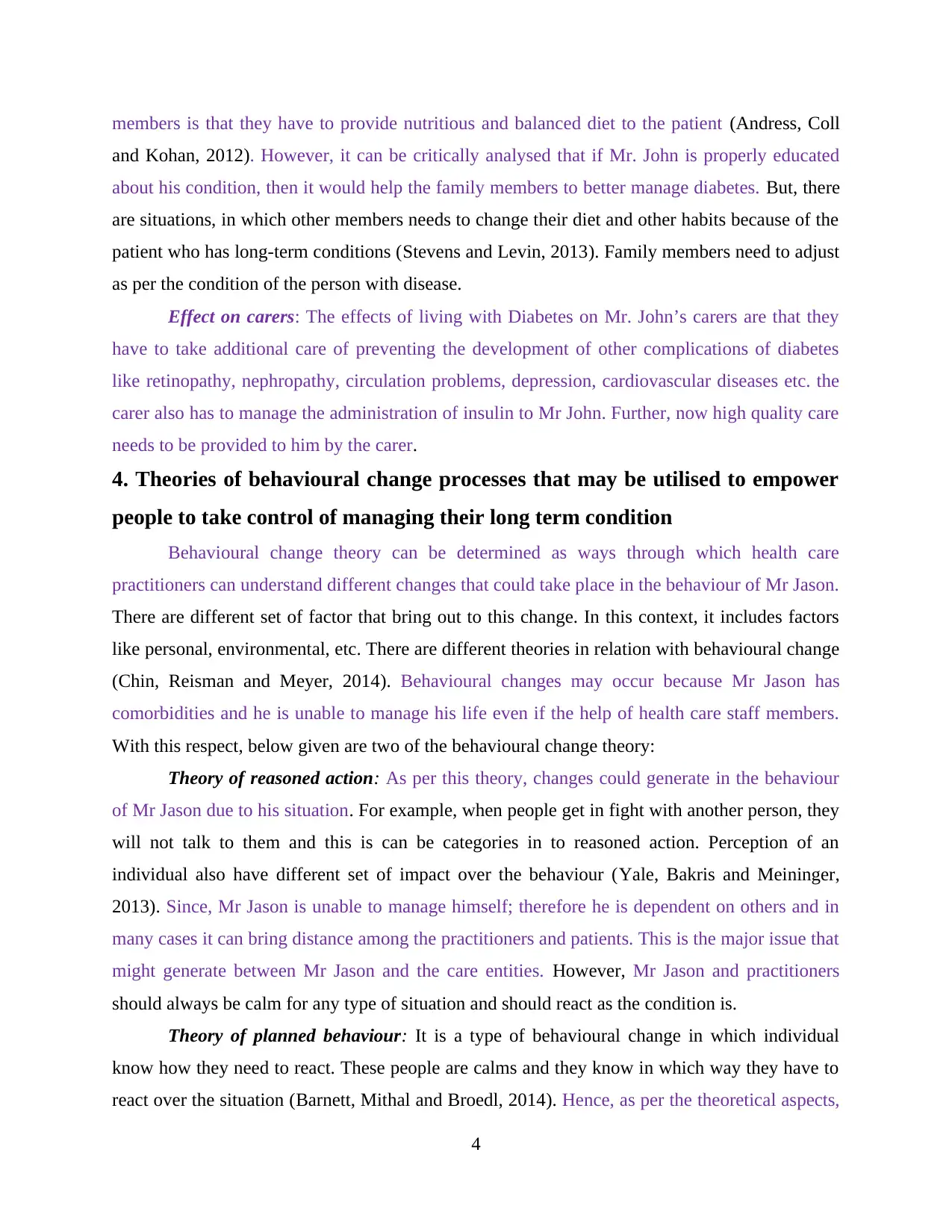
members is that they have to provide nutritious and balanced diet to the patient (Andress, Coll
and Kohan, 2012). However, it can be critically analysed that if Mr. John is properly educated
about his condition, then it would help the family members to better manage diabetes. But, there
are situations, in which other members needs to change their diet and other habits because of the
patient who has long-term conditions (Stevens and Levin, 2013). Family members need to adjust
as per the condition of the person with disease.
Effect on carers: The effects of living with Diabetes on Mr. John’s carers are that they
have to take additional care of preventing the development of other complications of diabetes
like retinopathy, nephropathy, circulation problems, depression, cardiovascular diseases etc. the
carer also has to manage the administration of insulin to Mr John. Further, now high quality care
needs to be provided to him by the carer.
4. Theories of behavioural change processes that may be utilised to empower
people to take control of managing their long term condition
Behavioural change theory can be determined as ways through which health care
practitioners can understand different changes that could take place in the behaviour of Mr Jason.
There are different set of factor that bring out to this change. In this context, it includes factors
like personal, environmental, etc. There are different theories in relation with behavioural change
(Chin, Reisman and Meyer, 2014). Behavioural changes may occur because Mr Jason has
comorbidities and he is unable to manage his life even if the help of health care staff members.
With this respect, below given are two of the behavioural change theory:
Theory of reasoned action: As per this theory, changes could generate in the behaviour
of Mr Jason due to his situation. For example, when people get in fight with another person, they
will not talk to them and this is can be categories in to reasoned action. Perception of an
individual also have different set of impact over the behaviour (Yale, Bakris and Meininger,
2013). Since, Mr Jason is unable to manage himself; therefore he is dependent on others and in
many cases it can bring distance among the practitioners and patients. This is the major issue that
might generate between Mr Jason and the care entities. However, Mr Jason and practitioners
should always be calm for any type of situation and should react as the condition is.
Theory of planned behaviour: It is a type of behavioural change in which individual
know how they need to react. These people are calms and they know in which way they have to
react over the situation (Barnett, Mithal and Broedl, 2014). Hence, as per the theoretical aspects,
4
and Kohan, 2012). However, it can be critically analysed that if Mr. John is properly educated
about his condition, then it would help the family members to better manage diabetes. But, there
are situations, in which other members needs to change their diet and other habits because of the
patient who has long-term conditions (Stevens and Levin, 2013). Family members need to adjust
as per the condition of the person with disease.
Effect on carers: The effects of living with Diabetes on Mr. John’s carers are that they
have to take additional care of preventing the development of other complications of diabetes
like retinopathy, nephropathy, circulation problems, depression, cardiovascular diseases etc. the
carer also has to manage the administration of insulin to Mr John. Further, now high quality care
needs to be provided to him by the carer.
4. Theories of behavioural change processes that may be utilised to empower
people to take control of managing their long term condition
Behavioural change theory can be determined as ways through which health care
practitioners can understand different changes that could take place in the behaviour of Mr Jason.
There are different set of factor that bring out to this change. In this context, it includes factors
like personal, environmental, etc. There are different theories in relation with behavioural change
(Chin, Reisman and Meyer, 2014). Behavioural changes may occur because Mr Jason has
comorbidities and he is unable to manage his life even if the help of health care staff members.
With this respect, below given are two of the behavioural change theory:
Theory of reasoned action: As per this theory, changes could generate in the behaviour
of Mr Jason due to his situation. For example, when people get in fight with another person, they
will not talk to them and this is can be categories in to reasoned action. Perception of an
individual also have different set of impact over the behaviour (Yale, Bakris and Meininger,
2013). Since, Mr Jason is unable to manage himself; therefore he is dependent on others and in
many cases it can bring distance among the practitioners and patients. This is the major issue that
might generate between Mr Jason and the care entities. However, Mr Jason and practitioners
should always be calm for any type of situation and should react as the condition is.
Theory of planned behaviour: It is a type of behavioural change in which individual
know how they need to react. These people are calms and they know in which way they have to
react over the situation (Barnett, Mithal and Broedl, 2014). Hence, as per the theoretical aspects,
4
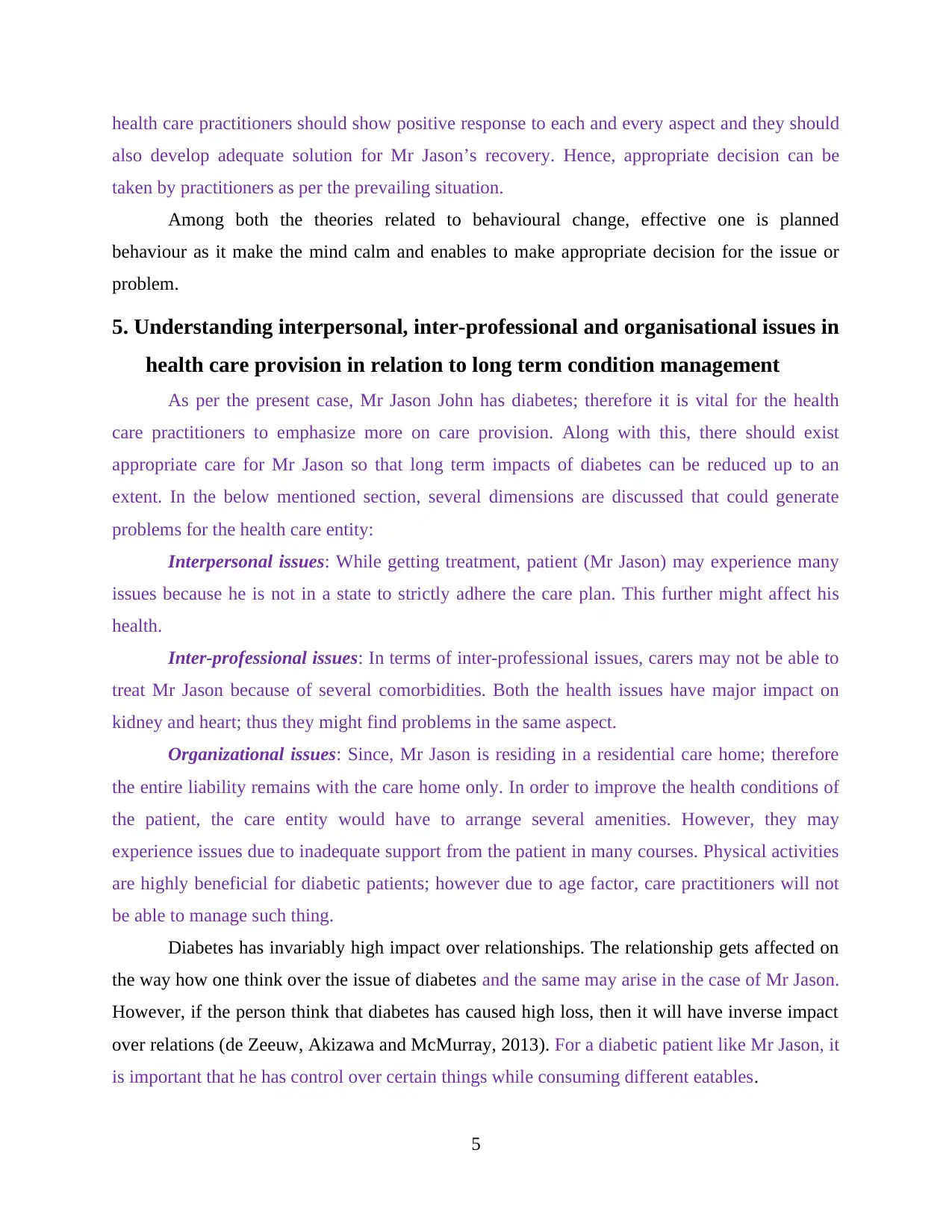
health care practitioners should show positive response to each and every aspect and they should
also develop adequate solution for Mr Jason’s recovery. Hence, appropriate decision can be
taken by practitioners as per the prevailing situation.
Among both the theories related to behavioural change, effective one is planned
behaviour as it make the mind calm and enables to make appropriate decision for the issue or
problem.
5. Understanding interpersonal, inter-professional and organisational issues in
health care provision in relation to long term condition management
As per the present case, Mr Jason John has diabetes; therefore it is vital for the health
care practitioners to emphasize more on care provision. Along with this, there should exist
appropriate care for Mr Jason so that long term impacts of diabetes can be reduced up to an
extent. In the below mentioned section, several dimensions are discussed that could generate
problems for the health care entity:
Interpersonal issues: While getting treatment, patient (Mr Jason) may experience many
issues because he is not in a state to strictly adhere the care plan. This further might affect his
health.
Inter-professional issues: In terms of inter-professional issues, carers may not be able to
treat Mr Jason because of several comorbidities. Both the health issues have major impact on
kidney and heart; thus they might find problems in the same aspect.
Organizational issues: Since, Mr Jason is residing in a residential care home; therefore
the entire liability remains with the care home only. In order to improve the health conditions of
the patient, the care entity would have to arrange several amenities. However, they may
experience issues due to inadequate support from the patient in many courses. Physical activities
are highly beneficial for diabetic patients; however due to age factor, care practitioners will not
be able to manage such thing.
Diabetes has invariably high impact over relationships. The relationship gets affected on
the way how one think over the issue of diabetes and the same may arise in the case of Mr Jason.
However, if the person think that diabetes has caused high loss, then it will have inverse impact
over relations (de Zeeuw, Akizawa and McMurray, 2013). For a diabetic patient like Mr Jason, it
is important that he has control over certain things while consuming different eatables.
5
also develop adequate solution for Mr Jason’s recovery. Hence, appropriate decision can be
taken by practitioners as per the prevailing situation.
Among both the theories related to behavioural change, effective one is planned
behaviour as it make the mind calm and enables to make appropriate decision for the issue or
problem.
5. Understanding interpersonal, inter-professional and organisational issues in
health care provision in relation to long term condition management
As per the present case, Mr Jason John has diabetes; therefore it is vital for the health
care practitioners to emphasize more on care provision. Along with this, there should exist
appropriate care for Mr Jason so that long term impacts of diabetes can be reduced up to an
extent. In the below mentioned section, several dimensions are discussed that could generate
problems for the health care entity:
Interpersonal issues: While getting treatment, patient (Mr Jason) may experience many
issues because he is not in a state to strictly adhere the care plan. This further might affect his
health.
Inter-professional issues: In terms of inter-professional issues, carers may not be able to
treat Mr Jason because of several comorbidities. Both the health issues have major impact on
kidney and heart; thus they might find problems in the same aspect.
Organizational issues: Since, Mr Jason is residing in a residential care home; therefore
the entire liability remains with the care home only. In order to improve the health conditions of
the patient, the care entity would have to arrange several amenities. However, they may
experience issues due to inadequate support from the patient in many courses. Physical activities
are highly beneficial for diabetic patients; however due to age factor, care practitioners will not
be able to manage such thing.
Diabetes has invariably high impact over relationships. The relationship gets affected on
the way how one think over the issue of diabetes and the same may arise in the case of Mr Jason.
However, if the person think that diabetes has caused high loss, then it will have inverse impact
over relations (de Zeeuw, Akizawa and McMurray, 2013). For a diabetic patient like Mr Jason, it
is important that he has control over certain things while consuming different eatables.
5
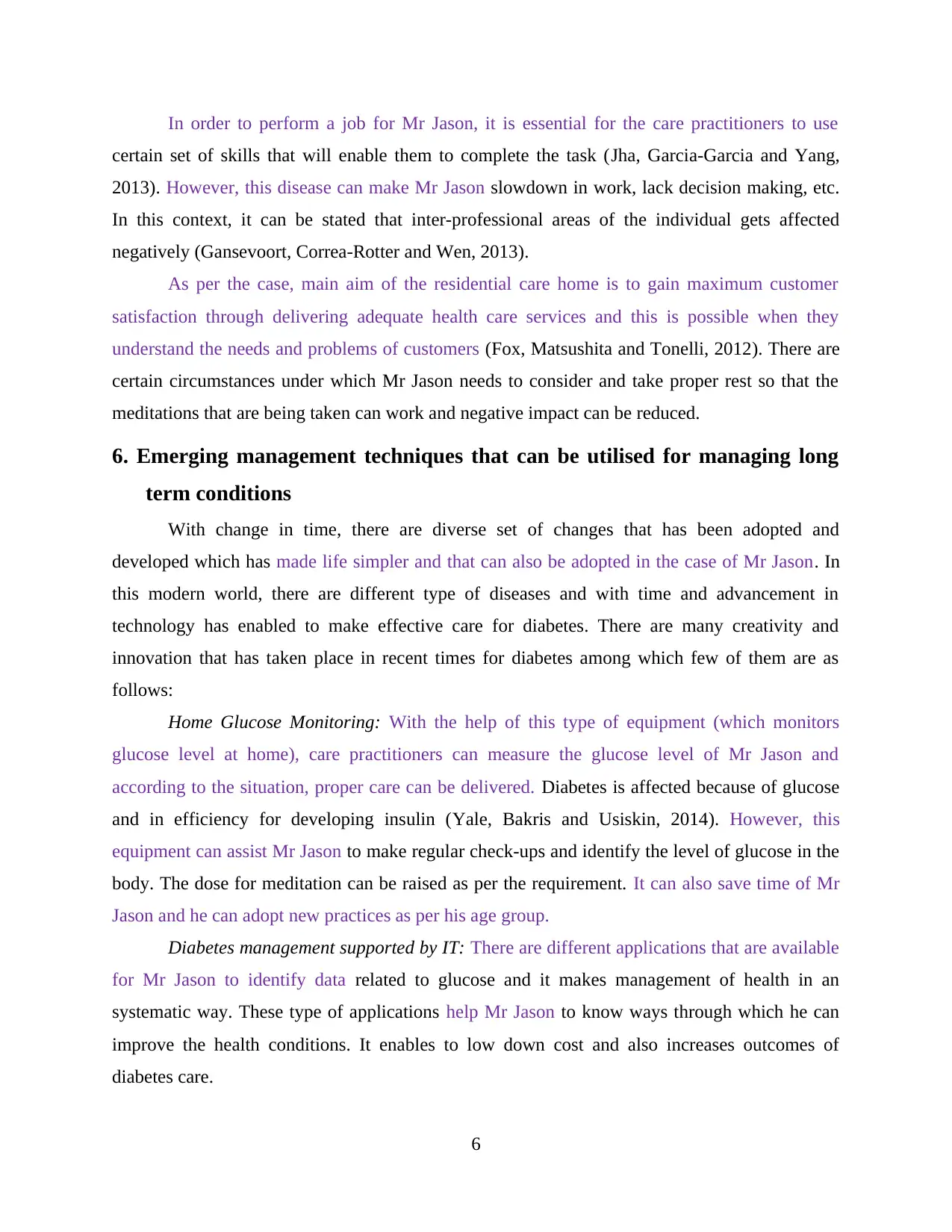
In order to perform a job for Mr Jason, it is essential for the care practitioners to use
certain set of skills that will enable them to complete the task (Jha, Garcia-Garcia and Yang,
2013). However, this disease can make Mr Jason slowdown in work, lack decision making, etc.
In this context, it can be stated that inter-professional areas of the individual gets affected
negatively (Gansevoort, Correa-Rotter and Wen, 2013).
As per the case, main aim of the residential care home is to gain maximum customer
satisfaction through delivering adequate health care services and this is possible when they
understand the needs and problems of customers (Fox, Matsushita and Tonelli, 2012). There are
certain circumstances under which Mr Jason needs to consider and take proper rest so that the
meditations that are being taken can work and negative impact can be reduced.
6. Emerging management techniques that can be utilised for managing long
term conditions
With change in time, there are diverse set of changes that has been adopted and
developed which has made life simpler and that can also be adopted in the case of Mr Jason. In
this modern world, there are different type of diseases and with time and advancement in
technology has enabled to make effective care for diabetes. There are many creativity and
innovation that has taken place in recent times for diabetes among which few of them are as
follows:
Home Glucose Monitoring: With the help of this type of equipment (which monitors
glucose level at home), care practitioners can measure the glucose level of Mr Jason and
according to the situation, proper care can be delivered. Diabetes is affected because of glucose
and in efficiency for developing insulin (Yale, Bakris and Usiskin, 2014). However, this
equipment can assist Mr Jason to make regular check-ups and identify the level of glucose in the
body. The dose for meditation can be raised as per the requirement. It can also save time of Mr
Jason and he can adopt new practices as per his age group.
Diabetes management supported by IT: There are different applications that are available
for Mr Jason to identify data related to glucose and it makes management of health in an
systematic way. These type of applications help Mr Jason to know ways through which he can
improve the health conditions. It enables to low down cost and also increases outcomes of
diabetes care.
6
certain set of skills that will enable them to complete the task (Jha, Garcia-Garcia and Yang,
2013). However, this disease can make Mr Jason slowdown in work, lack decision making, etc.
In this context, it can be stated that inter-professional areas of the individual gets affected
negatively (Gansevoort, Correa-Rotter and Wen, 2013).
As per the case, main aim of the residential care home is to gain maximum customer
satisfaction through delivering adequate health care services and this is possible when they
understand the needs and problems of customers (Fox, Matsushita and Tonelli, 2012). There are
certain circumstances under which Mr Jason needs to consider and take proper rest so that the
meditations that are being taken can work and negative impact can be reduced.
6. Emerging management techniques that can be utilised for managing long
term conditions
With change in time, there are diverse set of changes that has been adopted and
developed which has made life simpler and that can also be adopted in the case of Mr Jason. In
this modern world, there are different type of diseases and with time and advancement in
technology has enabled to make effective care for diabetes. There are many creativity and
innovation that has taken place in recent times for diabetes among which few of them are as
follows:
Home Glucose Monitoring: With the help of this type of equipment (which monitors
glucose level at home), care practitioners can measure the glucose level of Mr Jason and
according to the situation, proper care can be delivered. Diabetes is affected because of glucose
and in efficiency for developing insulin (Yale, Bakris and Usiskin, 2014). However, this
equipment can assist Mr Jason to make regular check-ups and identify the level of glucose in the
body. The dose for meditation can be raised as per the requirement. It can also save time of Mr
Jason and he can adopt new practices as per his age group.
Diabetes management supported by IT: There are different applications that are available
for Mr Jason to identify data related to glucose and it makes management of health in an
systematic way. These type of applications help Mr Jason to know ways through which he can
improve the health conditions. It enables to low down cost and also increases outcomes of
diabetes care.
6
Paraphrase This Document
Need a fresh take? Get an instant paraphrase of this document with our AI Paraphraser
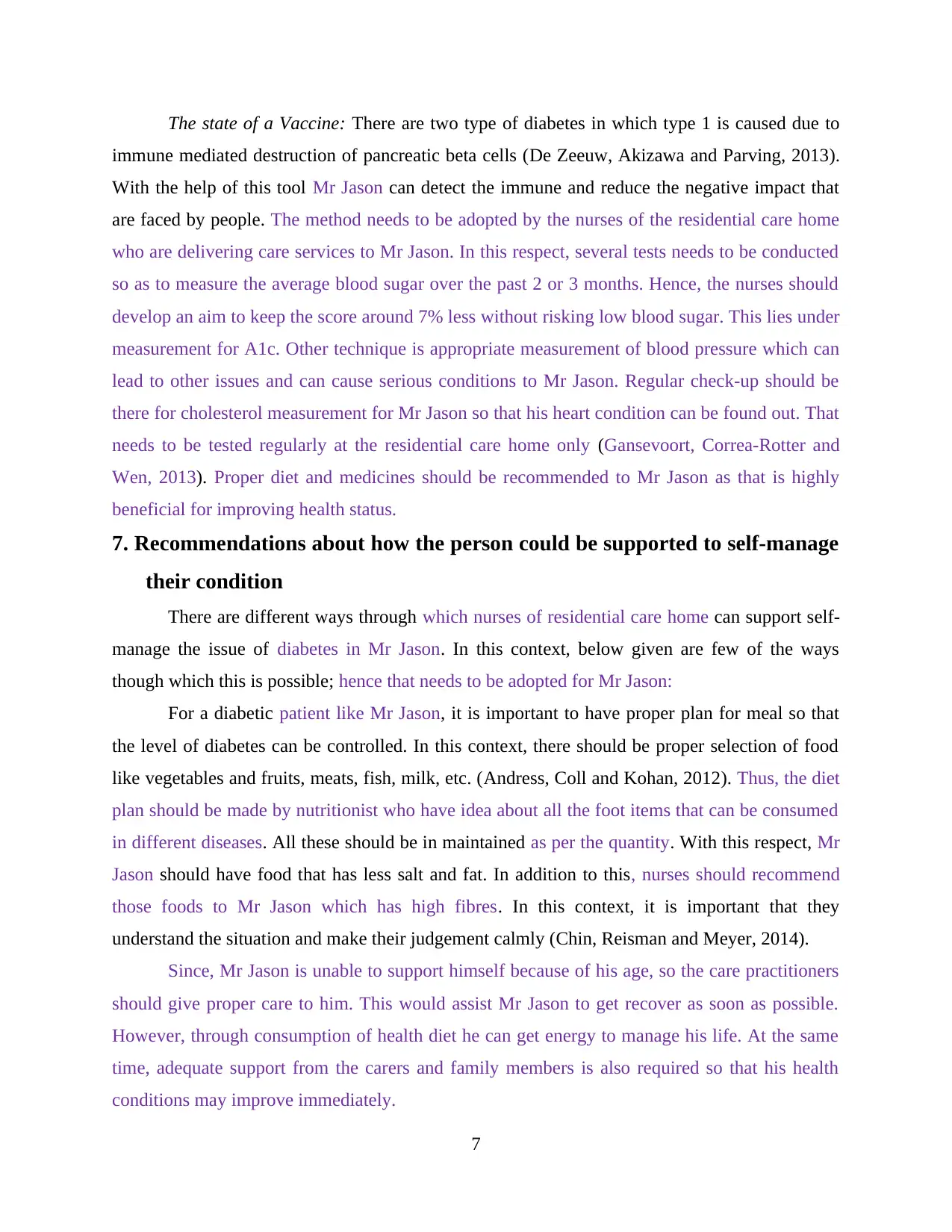
The state of a Vaccine: There are two type of diabetes in which type 1 is caused due to
immune mediated destruction of pancreatic beta cells (De Zeeuw, Akizawa and Parving, 2013).
With the help of this tool Mr Jason can detect the immune and reduce the negative impact that
are faced by people. The method needs to be adopted by the nurses of the residential care home
who are delivering care services to Mr Jason. In this respect, several tests needs to be conducted
so as to measure the average blood sugar over the past 2 or 3 months. Hence, the nurses should
develop an aim to keep the score around 7% less without risking low blood sugar. This lies under
measurement for A1c. Other technique is appropriate measurement of blood pressure which can
lead to other issues and can cause serious conditions to Mr Jason. Regular check-up should be
there for cholesterol measurement for Mr Jason so that his heart condition can be found out. That
needs to be tested regularly at the residential care home only (Gansevoort, Correa-Rotter and
Wen, 2013). Proper diet and medicines should be recommended to Mr Jason as that is highly
beneficial for improving health status.
7. Recommendations about how the person could be supported to self-manage
their condition
There are different ways through which nurses of residential care home can support self-
manage the issue of diabetes in Mr Jason. In this context, below given are few of the ways
though which this is possible; hence that needs to be adopted for Mr Jason:
For a diabetic patient like Mr Jason, it is important to have proper plan for meal so that
the level of diabetes can be controlled. In this context, there should be proper selection of food
like vegetables and fruits, meats, fish, milk, etc. (Andress, Coll and Kohan, 2012). Thus, the diet
plan should be made by nutritionist who have idea about all the foot items that can be consumed
in different diseases. All these should be in maintained as per the quantity. With this respect, Mr
Jason should have food that has less salt and fat. In addition to this, nurses should recommend
those foods to Mr Jason which has high fibres. In this context, it is important that they
understand the situation and make their judgement calmly (Chin, Reisman and Meyer, 2014).
Since, Mr Jason is unable to support himself because of his age, so the care practitioners
should give proper care to him. This would assist Mr Jason to get recover as soon as possible.
However, through consumption of health diet he can get energy to manage his life. At the same
time, adequate support from the carers and family members is also required so that his health
conditions may improve immediately.
7
immune mediated destruction of pancreatic beta cells (De Zeeuw, Akizawa and Parving, 2013).
With the help of this tool Mr Jason can detect the immune and reduce the negative impact that
are faced by people. The method needs to be adopted by the nurses of the residential care home
who are delivering care services to Mr Jason. In this respect, several tests needs to be conducted
so as to measure the average blood sugar over the past 2 or 3 months. Hence, the nurses should
develop an aim to keep the score around 7% less without risking low blood sugar. This lies under
measurement for A1c. Other technique is appropriate measurement of blood pressure which can
lead to other issues and can cause serious conditions to Mr Jason. Regular check-up should be
there for cholesterol measurement for Mr Jason so that his heart condition can be found out. That
needs to be tested regularly at the residential care home only (Gansevoort, Correa-Rotter and
Wen, 2013). Proper diet and medicines should be recommended to Mr Jason as that is highly
beneficial for improving health status.
7. Recommendations about how the person could be supported to self-manage
their condition
There are different ways through which nurses of residential care home can support self-
manage the issue of diabetes in Mr Jason. In this context, below given are few of the ways
though which this is possible; hence that needs to be adopted for Mr Jason:
For a diabetic patient like Mr Jason, it is important to have proper plan for meal so that
the level of diabetes can be controlled. In this context, there should be proper selection of food
like vegetables and fruits, meats, fish, milk, etc. (Andress, Coll and Kohan, 2012). Thus, the diet
plan should be made by nutritionist who have idea about all the foot items that can be consumed
in different diseases. All these should be in maintained as per the quantity. With this respect, Mr
Jason should have food that has less salt and fat. In addition to this, nurses should recommend
those foods to Mr Jason which has high fibres. In this context, it is important that they
understand the situation and make their judgement calmly (Chin, Reisman and Meyer, 2014).
Since, Mr Jason is unable to support himself because of his age, so the care practitioners
should give proper care to him. This would assist Mr Jason to get recover as soon as possible.
However, through consumption of health diet he can get energy to manage his life. At the same
time, adequate support from the carers and family members is also required so that his health
conditions may improve immediately.
7
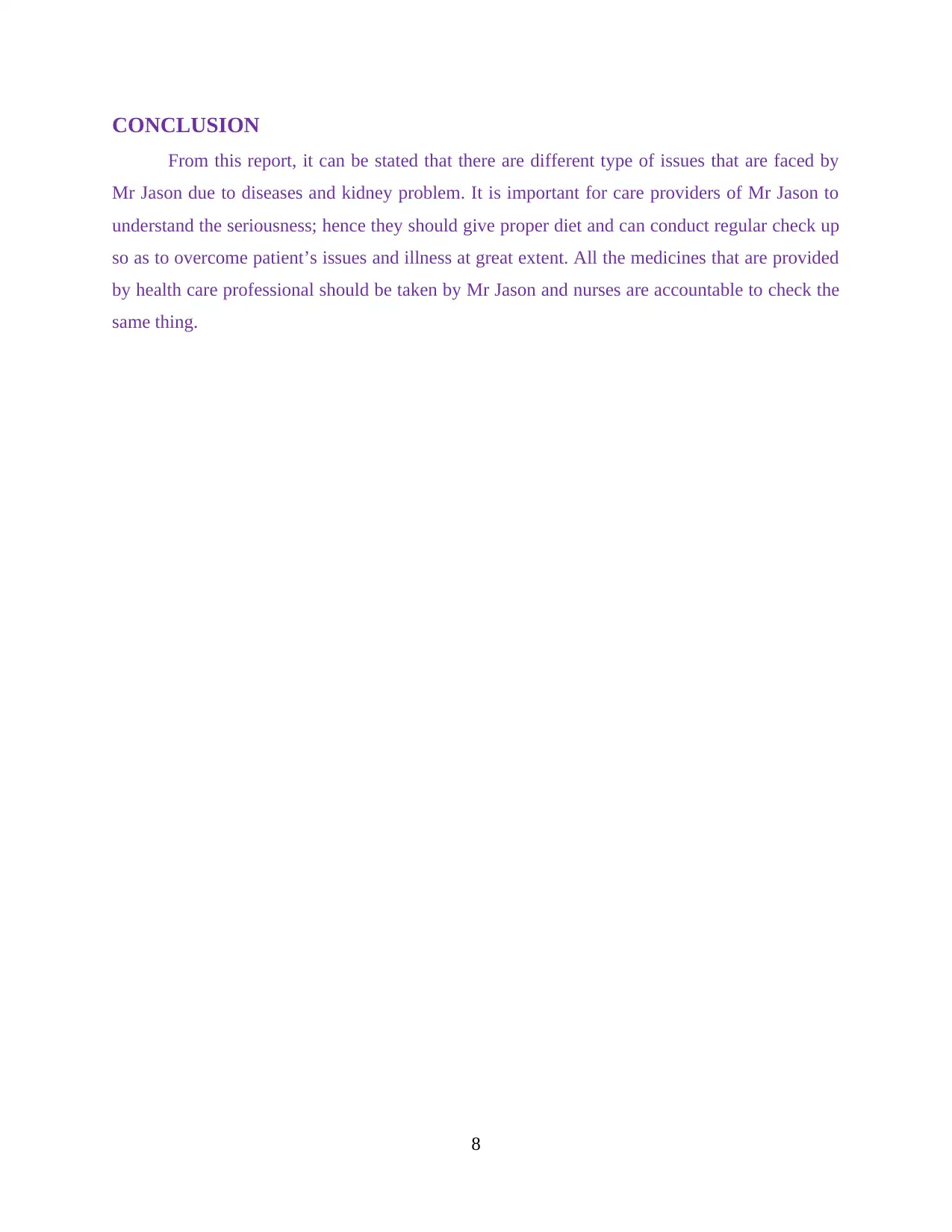
CONCLUSION
From this report, it can be stated that there are different type of issues that are faced by
Mr Jason due to diseases and kidney problem. It is important for care providers of Mr Jason to
understand the seriousness; hence they should give proper diet and can conduct regular check up
so as to overcome patient’s issues and illness at great extent. All the medicines that are provided
by health care professional should be taken by Mr Jason and nurses are accountable to check the
same thing.
8
From this report, it can be stated that there are different type of issues that are faced by
Mr Jason due to diseases and kidney problem. It is important for care providers of Mr Jason to
understand the seriousness; hence they should give proper diet and can conduct regular check up
so as to overcome patient’s issues and illness at great extent. All the medicines that are provided
by health care professional should be taken by Mr Jason and nurses are accountable to check the
same thing.
8
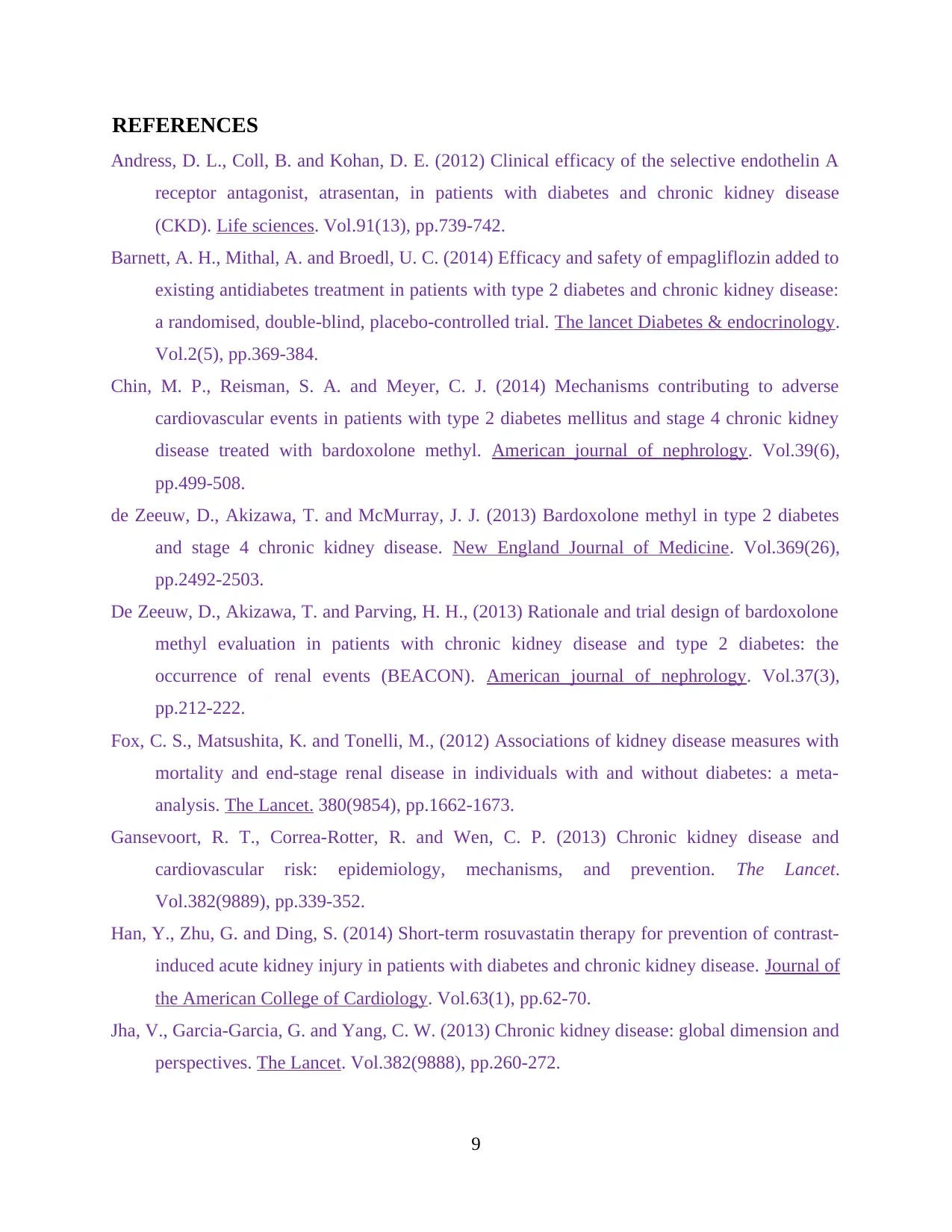
REFERENCES
Andress, D. L., Coll, B. and Kohan, D. E. (2012) Clinical efficacy of the selective endothelin A
receptor antagonist, atrasentan, in patients with diabetes and chronic kidney disease
(CKD). Life sciences. Vol.91(13), pp.739-742.
Barnett, A. H., Mithal, A. and Broedl, U. C. (2014) Efficacy and safety of empagliflozin added to
existing antidiabetes treatment in patients with type 2 diabetes and chronic kidney disease:
a randomised, double-blind, placebo-controlled trial. The lancet Diabetes & endocrinology.
Vol.2(5), pp.369-384.
Chin, M. P., Reisman, S. A. and Meyer, C. J. (2014) Mechanisms contributing to adverse
cardiovascular events in patients with type 2 diabetes mellitus and stage 4 chronic kidney
disease treated with bardoxolone methyl. American journal of nephrology. Vol.39(6),
pp.499-508.
de Zeeuw, D., Akizawa, T. and McMurray, J. J. (2013) Bardoxolone methyl in type 2 diabetes
and stage 4 chronic kidney disease. New England Journal of Medicine. Vol.369(26),
pp.2492-2503.
De Zeeuw, D., Akizawa, T. and Parving, H. H., (2013) Rationale and trial design of bardoxolone
methyl evaluation in patients with chronic kidney disease and type 2 diabetes: the
occurrence of renal events (BEACON). American journal of nephrology. Vol.37(3),
pp.212-222.
Fox, C. S., Matsushita, K. and Tonelli, M., (2012) Associations of kidney disease measures with
mortality and end-stage renal disease in individuals with and without diabetes: a meta-
analysis. The Lancet. 380(9854), pp.1662-1673.
Gansevoort, R. T., Correa-Rotter, R. and Wen, C. P. (2013) Chronic kidney disease and
cardiovascular risk: epidemiology, mechanisms, and prevention. The Lancet.
Vol.382(9889), pp.339-352.
Han, Y., Zhu, G. and Ding, S. (2014) Short-term rosuvastatin therapy for prevention of contrast-
induced acute kidney injury in patients with diabetes and chronic kidney disease. Journal of
the American College of Cardiology. Vol.63(1), pp.62-70.
Jha, V., Garcia-Garcia, G. and Yang, C. W. (2013) Chronic kidney disease: global dimension and
perspectives. The Lancet. Vol.382(9888), pp.260-272.
9
Andress, D. L., Coll, B. and Kohan, D. E. (2012) Clinical efficacy of the selective endothelin A
receptor antagonist, atrasentan, in patients with diabetes and chronic kidney disease
(CKD). Life sciences. Vol.91(13), pp.739-742.
Barnett, A. H., Mithal, A. and Broedl, U. C. (2014) Efficacy and safety of empagliflozin added to
existing antidiabetes treatment in patients with type 2 diabetes and chronic kidney disease:
a randomised, double-blind, placebo-controlled trial. The lancet Diabetes & endocrinology.
Vol.2(5), pp.369-384.
Chin, M. P., Reisman, S. A. and Meyer, C. J. (2014) Mechanisms contributing to adverse
cardiovascular events in patients with type 2 diabetes mellitus and stage 4 chronic kidney
disease treated with bardoxolone methyl. American journal of nephrology. Vol.39(6),
pp.499-508.
de Zeeuw, D., Akizawa, T. and McMurray, J. J. (2013) Bardoxolone methyl in type 2 diabetes
and stage 4 chronic kidney disease. New England Journal of Medicine. Vol.369(26),
pp.2492-2503.
De Zeeuw, D., Akizawa, T. and Parving, H. H., (2013) Rationale and trial design of bardoxolone
methyl evaluation in patients with chronic kidney disease and type 2 diabetes: the
occurrence of renal events (BEACON). American journal of nephrology. Vol.37(3),
pp.212-222.
Fox, C. S., Matsushita, K. and Tonelli, M., (2012) Associations of kidney disease measures with
mortality and end-stage renal disease in individuals with and without diabetes: a meta-
analysis. The Lancet. 380(9854), pp.1662-1673.
Gansevoort, R. T., Correa-Rotter, R. and Wen, C. P. (2013) Chronic kidney disease and
cardiovascular risk: epidemiology, mechanisms, and prevention. The Lancet.
Vol.382(9889), pp.339-352.
Han, Y., Zhu, G. and Ding, S. (2014) Short-term rosuvastatin therapy for prevention of contrast-
induced acute kidney injury in patients with diabetes and chronic kidney disease. Journal of
the American College of Cardiology. Vol.63(1), pp.62-70.
Jha, V., Garcia-Garcia, G. and Yang, C. W. (2013) Chronic kidney disease: global dimension and
perspectives. The Lancet. Vol.382(9888), pp.260-272.
9
Secure Best Marks with AI Grader
Need help grading? Try our AI Grader for instant feedback on your assignments.
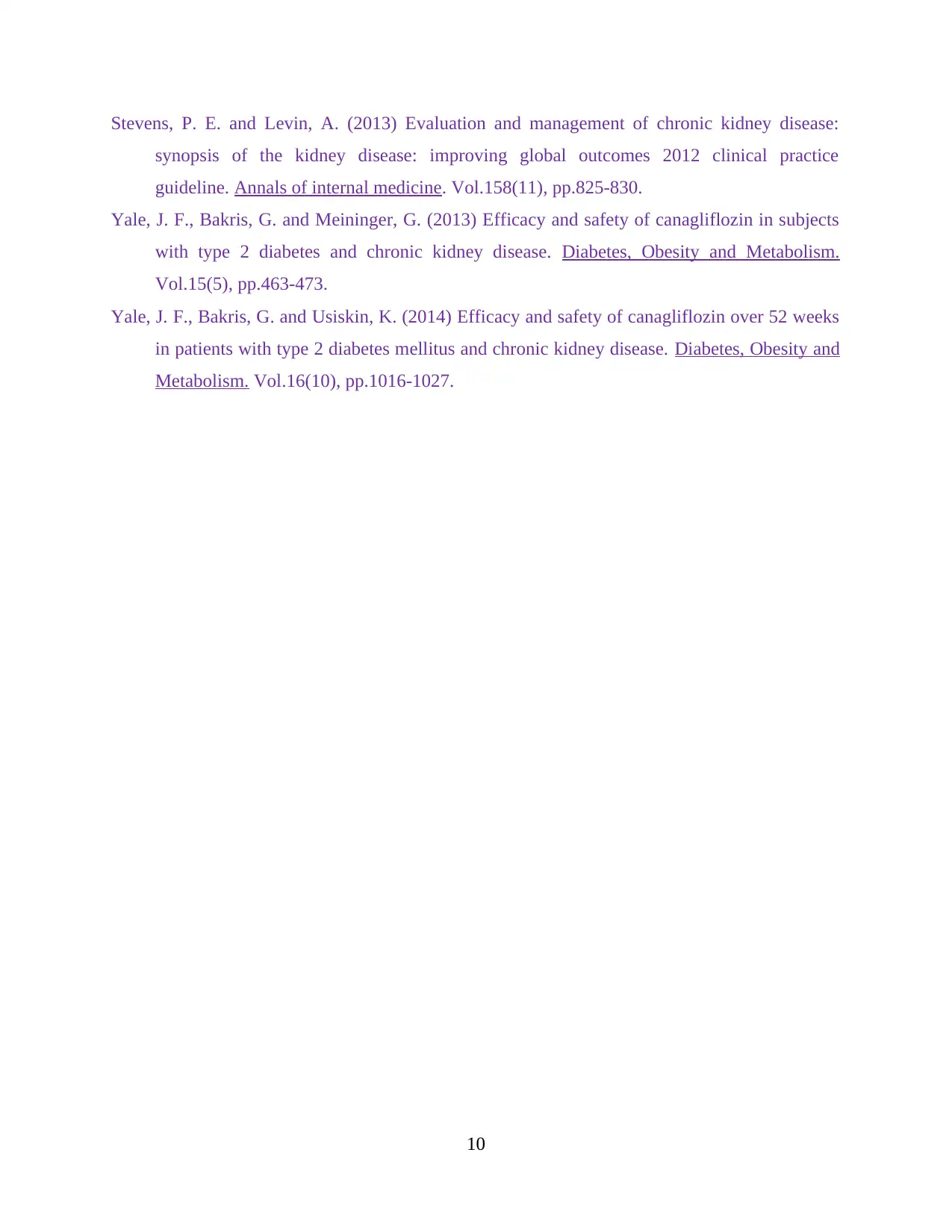
Stevens, P. E. and Levin, A. (2013) Evaluation and management of chronic kidney disease:
synopsis of the kidney disease: improving global outcomes 2012 clinical practice
guideline. Annals of internal medicine. Vol.158(11), pp.825-830.
Yale, J. F., Bakris, G. and Meininger, G. (2013) Efficacy and safety of canagliflozin in subjects
with type 2 diabetes and chronic kidney disease. Diabetes, Obesity and Metabolism.
Vol.15(5), pp.463-473.
Yale, J. F., Bakris, G. and Usiskin, K. (2014) Efficacy and safety of canagliflozin over 52 weeks
in patients with type 2 diabetes mellitus and chronic kidney disease. Diabetes, Obesity and
Metabolism. Vol.16(10), pp.1016-1027.
10
synopsis of the kidney disease: improving global outcomes 2012 clinical practice
guideline. Annals of internal medicine. Vol.158(11), pp.825-830.
Yale, J. F., Bakris, G. and Meininger, G. (2013) Efficacy and safety of canagliflozin in subjects
with type 2 diabetes and chronic kidney disease. Diabetes, Obesity and Metabolism.
Vol.15(5), pp.463-473.
Yale, J. F., Bakris, G. and Usiskin, K. (2014) Efficacy and safety of canagliflozin over 52 weeks
in patients with type 2 diabetes mellitus and chronic kidney disease. Diabetes, Obesity and
Metabolism. Vol.16(10), pp.1016-1027.
10
1 out of 11
Related Documents
Your All-in-One AI-Powered Toolkit for Academic Success.
+13062052269
info@desklib.com
Available 24*7 on WhatsApp / Email
![[object Object]](/_next/static/media/star-bottom.7253800d.svg)
Unlock your academic potential
© 2024 | Zucol Services PVT LTD | All rights reserved.




